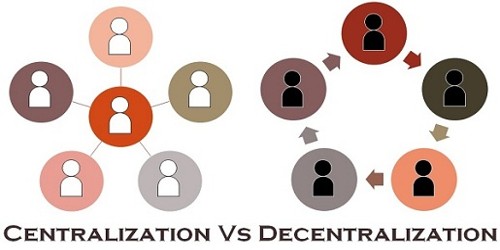Centralization is known as the systematic reservation of decision making authority at the top level management. It is said to be a process where the concentration of decision making is in a few hands. All the important decision and actions at the lower level, all subjects and actions at the lower level are subject to the approval of top management. It reduces the roles of subordinates and the top level assumes full authority of running business activities. Top managers have direct control over each and every activity of the organization while the decision making authority is also vested on them.
The implication of centralization can be :-
- Reservation of decision making power at top level.
- Reservation of operating authority with the middle level managers.
- Reservation of operation at lower level at the directions of the top level
Centralizes facilitates a manager to keep in touch with all the activities of the organization and facilitates quicker decisions. The act or process of centralizing, or the state of being centralized; the act or process of combining or reducing several parts into a whole; as, the centralization of power in the general government; the centralization of commerce in a city. This system is highly appropriate in small organizations performing business in a competitive environment. However, expansion of the size of the business creates complexities in business activities of the organization and in such a situation centralization becomes impractical. Top management needs to form departments and branches on the basis of nature of work and decision making authority should be delegated to the departmental heads.
Centralization is generally successful in small-scale enterprises. This is possible because the operations are limited and the proprietor is able to devotes personal attention to every activity of the business. This type of management is useful where emergency decisions are to be taken. With the expansion of business the control becomes difficult and the need for decentralization arises.
According to Fayol—”everything which goes to increase the importance of the subordinate’s role is decentralisation and everything which goes to reduce it is centralization.” The importance of the subordinate is reduced and the importance of the superior executive is increased in centralization.
Factors Determining Centralization of Authority:
The management of an undertaking may centralize decision-making for the following reasons:
Achieving Uniformity of Action:
Uniformity of action is possible when decision-making authority is centralized. The decisions taken at the top will be implemented at every level. There may be more than one unit under the same management and it may be desired to have same types of policies and procedures.
Facilitating Integration:
There may be a need to integrate all operations of the enterprise for achieving common objectives. Centralized management will facilitate integration of activities by devising common policies and programmes.
Promoting Personal Leadership:
The small enterprises grow on the strength and capability of their manager. Even big concerns too depend upon the qualities of their managers during initial periods. The whole authority will be in the hands of the chief executive. This will result in quick decisions and imaginative actions.
Handling Emergencies:
Under uncertain business conditions there is a need to take emergency decisions. Sometimes the existence of small- scale units is endangered if timely actions are not taken. Centralized authority will enable quick and timely decisions from short-term as well long-term perspective.
Information Source:















